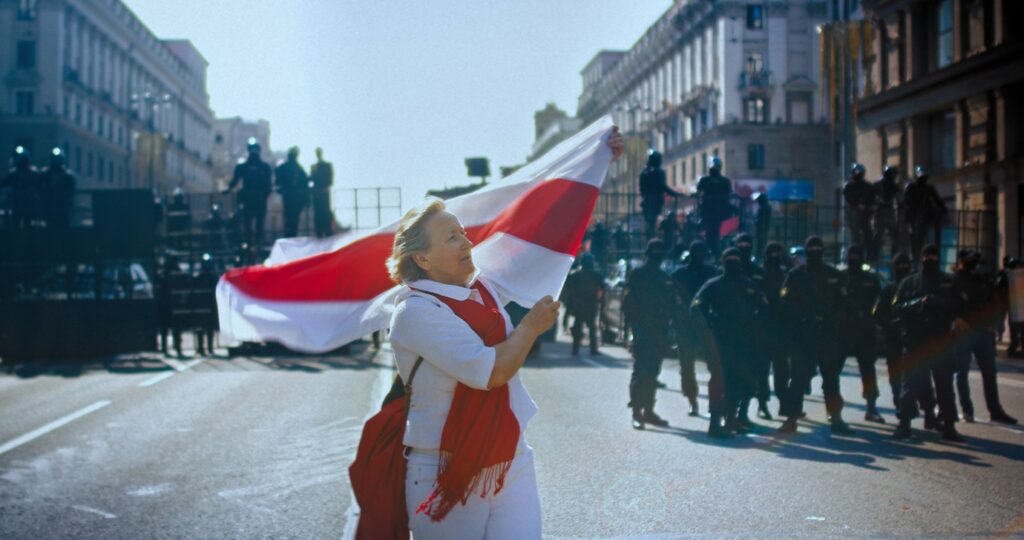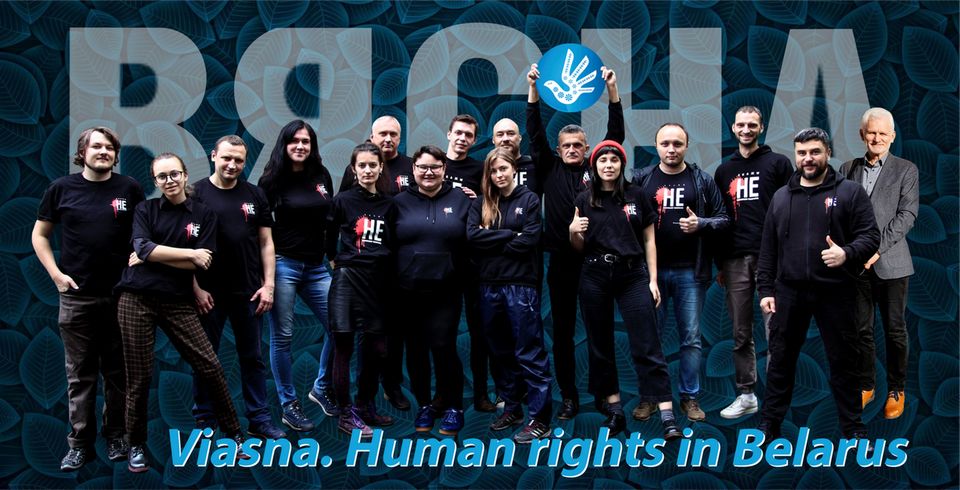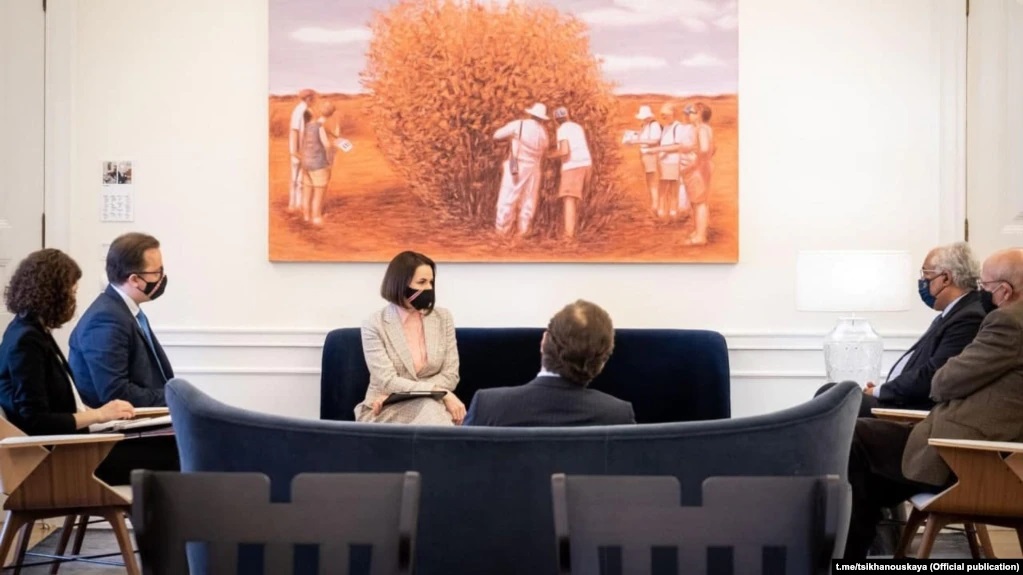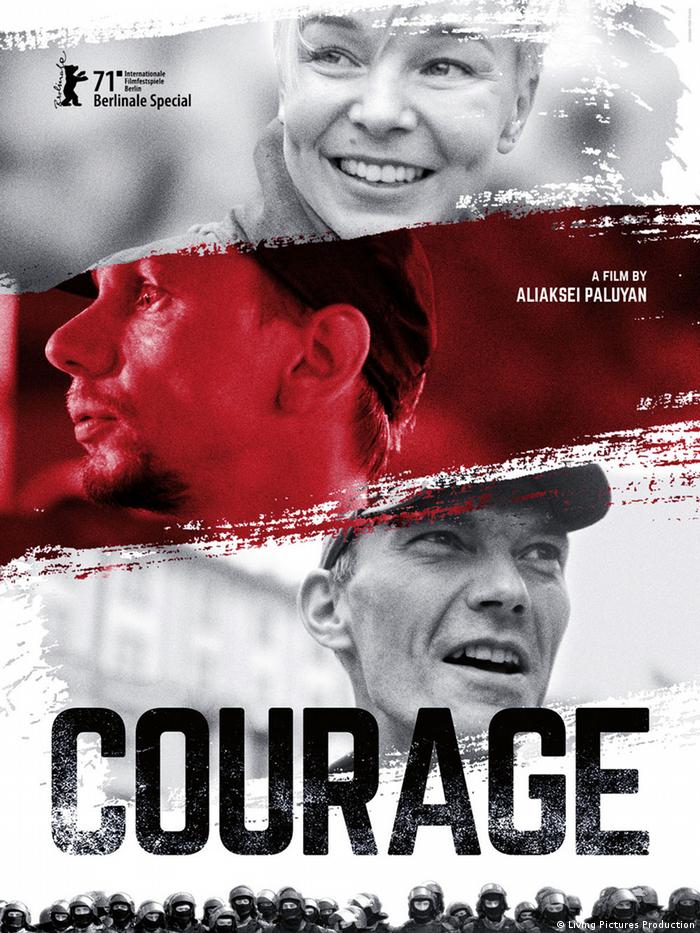Criminal case against Viasna Human Rights Centre; special showing of “Courage”, a film about Belarusian protests, at the Berlinale; Sviatlana Tsikhanouskaya’s visit to Portugal
6 March 2021 | Voice of Belarus

Source: Berlinale
A criminal case opened against Viasna Human Rights Centre
Valiantsin Stefanovich, deputy chair of Viasna Human Rights Centre, confirmed that the Investigative Committee of Belarus filed criminal charges against the human rights centre on suspicion of “organizing and actively participating in group actions that grossly violate public order” (Article 324 of the Criminal Code). According to the investigation, Viasna allegedly provides financing and other material support to organize illegal mass events. Viasna reports that searches were carried out in the offices of its regional branches and in the apartments of its members. In addition, human rights defenders and volunteers of Viasna – Marfa Rabkova, Andrei Chapiuk, Leanid Sudalenka and Tatsiana Lasitsa – were taken into custody.

Viasna Human Rights Centre is a non-governmental human rights organization that helps people detained at rallies and their families. About 200 volunteers of the centre work throughout the country. In April this year, the organization will celebrate its 25th anniversary.
All these years, Viasna has faced pressure, intimidation, and harassment of its members for protecting human rights in Belarus. Human rights activists emphasize that Viasna has never been the organizer of violent actions and has always supported only peaceful expression of civil and political freedoms.
Belarusian public organizations issued a statement in connection with the criminal prosecution of the centre’s activists. On Viasna’s website, human rights and other civil society organizations in Belarus expressed solidarity with Viasna and its work, referring to the criminal prosecution as “exclusively a persecution for active human rights activities”. The statement was signed by seven organizations: Legal Transformation Center (Lawtrend), Belarusian Helsinki Committee, Belarusian Association of Journalists, Assembly of Pro-Democratic NGOs of Belarus, Legal Initiative, FORB Initiative, and Human Constanta Consulting Centre.
Sviatlana Tsikhanouskaya visited Portugal: in the new Belarus the Akrestsina detention centre, like the Aljube prison, will also become a museum – the museum of resistance and freedom

During her visit to Portugal, Sviatlana Tsikhanouskaya met with Prime Minister António Costa, Foreign Minister Augusto Santos Silva, as well as José Manuel Barroso and other Portuguese politicians.
At the meetings, Tsikhanouskaya discussed the issues important for Belarus and all of Europe:
- urged taking action on the problem of political prisoners in Belarus, the persecution of human rights defenders and employees of Viasna Human Rights Centre, new criminal cases, and an attack on independent media;
- appealed to Portugal to use its Presidency in the EU to push for prioritizing the solution to the crisis in Belarus. To achieve it, new elections should take place in the fall of 2021 in Belarus;
- proposed to hold the next European Council on Foreign Relations (22 March 2021) with the participation of representatives of the democratic movement of Belarus;
- stressed the importance of isolating the Lukashenko regime and putting pressure on it, pointing out how to make sanctions more effective and tangible for the regime;
- discussed the creation of a special mission of the European Parliament to resolve the crisis in Belarus;
- spoke about the details of the Comprehensive Plan of Action for Belarus, as well as specific assistance to independent media, workers, lawyers, and representatives of religious communities affected by the regime.
At the meeting with Sergio Sousa Pinto, President of the Committee on Foreign Affairs and the Portuguese Communities, Sviatlana Tsikhanouskaya discussed the creation of a working group in the Portuguese parliament to assist Belarus: helping political prisoners and supporting civil society.
Sviatlana Tsikhanouskaya visited the Aljube Museum, a former prison for Portuguese political prisoners from 1926 to 1965. During the forty-year rule of the dictator Salazar, up to 50 thousand people were held there. The dictatorship of Salazar was the longest in Europe, but it did not resist the will of the people either.
Film “Courage” about protests in Belarus at the Berlinale

At the Berlin Film Festival, the viewers could attend a special screening of “Courage” on 5 March 2021. This film is the professional debut of documentary filmmaker Aliaksei Paluyan. It tells the story of the current protests in Belarus and artists who keep fighting for freedom. “Courage” shows rehearsals and performances of Belarus Free Theatre, near the infamous detention centre at Akrestsina Street. This footage was recorded during the outburst of the mass protests in the late summer and early autumn of 2020 in Minsk. The archival footage from the 1990s protests and demonstrations was also included in the film to honour the memory of the disappeared opposition members.
“This film is about the truth. Anyone who dares to speak against the regime risks being detained, or even die,” says the description at the Berlinale website. According to the press service of the film festival, the film cannot be watched without pain “because of the way it calmly and patiently measures the fragile scope the protesters are forced to act within”. It explains why Belarusians decided to resist. The film’s review also emphasized that “anyone who wants to live like a human and survive, needs this courage”.
Aliaksei Paluyan is a Belarusian producer who lives and works in Germany. His short film “Lake of Joy” based on the novel by Belarusian writer Viktar Martsinovich who received a number of European awards, was a nominee of European Film Academy in 2020, and even got included in the Oscar long list in 2021.
The director said that for him “Courage” was the story of people who turned from fearful to fearless. “Belarusians feel abandoned now. The regime tries to hide them behind the curtain, so the world would not see or hear them.” In his opinion, art can become the voice of Belarusians “lifting the curtain”. Unfortunately, the picture that the viewer sees behind this curtain is extremely sad and bleak. Fearless people, who have sacrificed their health, time, and even life, are facing the organized violence of the authorities and losing hope and faith. Paluyan’s film has no ending – just as there is no ending to what is happening in Belarus now.
For more information on the events of 6 March 2021, please visit Infocenter Free Belarus 2020: